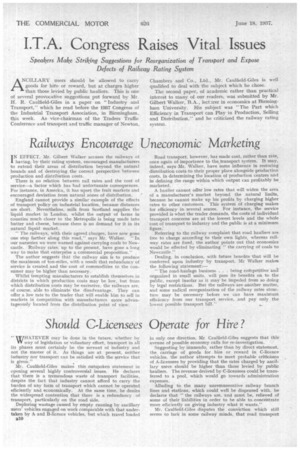Railways Encourage Uneconomic Marketing
Page 44

If you've noticed an error in this article please click here to report it so we can fix it.
IN EFFECT, Mr. Gilbert Walker accuses the railways of haying, by their rating system, encouraged manufacturers to extend their areas of distribution beyond the natural bounds and of destroying the correct perspective between production and distribution costs.
There is no relation between rail rates and the cost of service—a factor which has had unfortunate consequences. For instance, in America, it has upset the fruit markets and encouraged deviation from natural zones of distribution.
England cannot provide a similar example of the effects of transport policy on industrial location, because distances are short. Nevertheless, milk from Scotland supplies the liquid market in London, whilst the output of farms in counties much closer to the Metropolis is being made into butter and cheese, because there is no demand for it in its natural liquid market.
'The railways, with their agreed charges, have now gone one step farther along this road," says Mr. Walker. "In our nurseries we were warned against carrying coals to Newcastle. Railway rates, up to the present, have gone along way to make that enterprise a commercial proposition."
The author suggests that the railway aim is to produce the maximum of ton-miles, with a result that redundancy of service is created and the cost of commodities to the consumer may be higher than necessary..
Whilst tempting manufacturers to establish themselves in districts in which production costs may he low, but from which distribution costs may be excessive, the railways are, of course, able to eliminate the disadvantage. They can offer a low rate to the trader that will enable him to sell in markets in Competition with manufacturers More advantageously located from the distribution point of view. Road transport, however, has made cost, rather than rate, once again of importance to the transport system. It may, indeed, says -Mr. Walker, have some influence in restoring distribution costs to their proper place alongside production costs, in determining the location of production centres and in defining the range within which output can profitably be marketed.
A haulier cannot offer low rates that will widen the area of a manufacturer's market beyond the natural limits, because he cannot make up his profits by charging higher rates to other customers. This system of charging makes for efficiency in several senses. For instance, the service provided is what the trader demands, the costs of individual transport concerns are at the lowest levels and the whole cost of transport to industry and the public is at a minimum figure.
Referring to the railway complaint that road hauliers are free to charge according to their own lights, whereas railway rates are fixed, the author points out that economics would be effected by eliminating " the carrying of coals to Newcastle."
Dealing, in conclusion, with future benefits that will be conferred upon industry by transport, Mr Walker make9 the following statement:—
" The road-haulage business . . . being cotnpetitive ana organized in small units, will pass its .benefits on to the public, except insofar as it may he impeded from so doing by legal restrictions. But the railways are another matter, and some radical reorganization of the railway rates structure may be necessary before we. can have maximum efficiency from our transport service, and pay only the lowest possible transport bill."




























































































